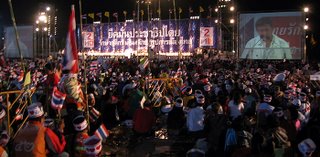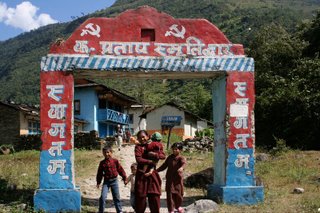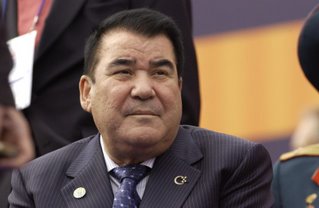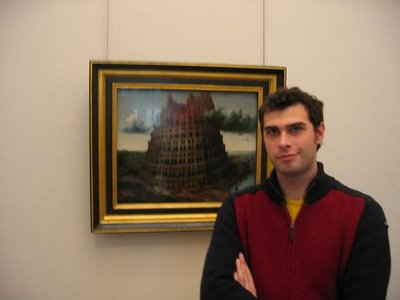the year in geopolitics
I write alot about American politics, but its not like I don't spend time reading about the politics of other countries. In fact, there have been several great political stories from across the world in the past year, some of which I have even blogged about. So without further ado, here is what I think have been the most underreported stories from the past year in geopolitics:
The military coup in Thailand: Like many Americans, my first exposure to Thai culture was their fabulous cuisine. One thing I noticed at just about every Thai restaurant was a picture of the king, Bhumibol Adulyadej aka Rama IX. The Thai people are said to hold him in the highest regard: Thailand was the only country in southeast Asia to never be colonized by a foreign power. Thus rather than a military junta (Burma) or Communist government (Vietnam/Laos), it is a constitutional monarchy where the prime minister leads the country's government.
 That was, until this past fall: on September 19, less than a month before the scheduled national parliamentary elections, military leaders lead a coup against the government of Prime Minister Thaksin Shinawatra. The junta abrogated and dissolved the 1997 Constitution, suspended Parliament, banned all demonstrations and rallies, censored the media, and ruled by decree.
That was, until this past fall: on September 19, less than a month before the scheduled national parliamentary elections, military leaders lead a coup against the government of Prime Minister Thaksin Shinawatra. The junta abrogated and dissolved the 1997 Constitution, suspended Parliament, banned all demonstrations and rallies, censored the media, and ruled by decree.Shinawatra came to power in 2001, as the country was still reeling from the 1997 economic crisis. Shinawatra was a telecommunications tycoon who promised a CEO-style management of Thailand's shaky economy and greater aid to the rural poor. Even after winning a landslide reelection, discontent among middle-class taxpayers lead to massive protests in the streets of Bangkok against Thaksin. At best, Shinawatra has not run the company like any modern CEO but like a telco owner used to monopolistic government concessions, cutting off dissent to his policies in the media and with a contempt towards constitutional checks and balances. Reporters Without Borders world-wide Press Freedom Index 2005 ranked Thailand 107th out of 167 countries, dropping from 59th in 2004
 So the king's silence on the coup was notable, and influential given his quasi-divine status and his material status as one of the wealthiest people in the world. An unintended consequence of the coup has been the cancellation of Thailand's participation in the One Laptop Per Child project which seeks to provided low-cost computers to elementary school children in developing nations.
So the king's silence on the coup was notable, and influential given his quasi-divine status and his material status as one of the wealthiest people in the world. An unintended consequence of the coup has been the cancellation of Thailand's participation in the One Laptop Per Child project which seeks to provided low-cost computers to elementary school children in developing nations.Loktantra Andolan, or the Nepalese democracy movement which is pushing the country towards parliamentary democracy from the absolute rule of King Gyanendra. The King had declared martial law, blaming Maoist insurgents for his pressing need to dissolve parliament. Political parties formed an alliance with the Maoists and held a general strike, which forced the King to capitulate to the restoration to multiparty democracy. The most dramatic move of the post-Loktantra Andolan government came on 18 May 2006 when the Parliament unanimously voted to strip the King of many of his powers.
 The bill included:
The bill included:* Putting 90,000 troops in the hands of the parliament
* Placing a tax on the royal family and its assets
* Ending the Raj Parishad, a royal advisory council
* Eliminating royal references from army and government titles
* Declaring Nepal a secular country, not a Hindu Kingdom
 The act overrides the 1990 Constitution, written up following the Jana Andolan (People's Movement) and has been described as a Nepalese Magna Carta. Elections for a constituent assembly will be held in Nepal in June 2007. This assembly also will draft a new constitution, deciding the fate of the Nepalese monarchy.
The act overrides the 1990 Constitution, written up following the Jana Andolan (People's Movement) and has been described as a Nepalese Magna Carta. Elections for a constituent assembly will be held in Nepal in June 2007. This assembly also will draft a new constitution, deciding the fate of the Nepalese monarchy.The political crisis in Fiji:
The military played a pivotal role in another unstable democracy, this time on the Pacific island nation of Fiji. Commander of the Republic of FIji Military Forces, Commodore Josaia Vorege 'Frank' Bainimarama, had been growing increasingly and publicly discontent with the civilian government. Bainimarama accused te government of dealng too leniently with convicted perpetrators of two army mutinies and civilian coup that devastated the country in 2000.
 On the occasion of his 65th birthday on 4 February 2006, Prime Minister Laisenia Qarase stated that if re-elected in the election that was duly held on 6-13 May, it would very likely be his last term in office. He won reelection, but continuing disagreements between his government and the powerful Republic of Fiji Military Forces culminated in a military coup on 5 December. Fiji Village reported the next day that he had been flown to his home island of Vanuabalavu by the Military, while Radio New Zealand claimed that he had fled there. He told Radio New Zealand that he was "down but not out"; he intended to fight on, and called for a peaceful popular uprising. The BBC reports that after being warned by Commodore Bainimarama not to "incite violence", Prime Minister Qarase plans to return to Suva, from which he is banished, but has been warned that he faces arrest if he returns. From Vanuabalavu, he has remained outspoken in condemning the military takeover, comparing the new regime to those of Saddam Hussein, Adolf Hitler, and Idi Amin, in an interview quoted in the Fiji Times and Fiji Village on 13 and 14 December 2006.
On the occasion of his 65th birthday on 4 February 2006, Prime Minister Laisenia Qarase stated that if re-elected in the election that was duly held on 6-13 May, it would very likely be his last term in office. He won reelection, but continuing disagreements between his government and the powerful Republic of Fiji Military Forces culminated in a military coup on 5 December. Fiji Village reported the next day that he had been flown to his home island of Vanuabalavu by the Military, while Radio New Zealand claimed that he had fled there. He told Radio New Zealand that he was "down but not out"; he intended to fight on, and called for a peaceful popular uprising. The BBC reports that after being warned by Commodore Bainimarama not to "incite violence", Prime Minister Qarase plans to return to Suva, from which he is banished, but has been warned that he faces arrest if he returns. From Vanuabalavu, he has remained outspoken in condemning the military takeover, comparing the new regime to those of Saddam Hussein, Adolf Hitler, and Idi Amin, in an interview quoted in the Fiji Times and Fiji Village on 13 and 14 December 2006.Acting President Ratu Joni Madraiwiwi was removed from office on December 5th of last year by Bainimarama, who forcibly evicted with from his official residence the next day. An underlying reason for the unrest which has lead to four coups in the past twenty years of Fijian politics, was the cultural and religious differences between mostly Methodist ethnic Fijians and mostly Hindu Indian Fijians. On January 4, 2007, Bainimarama restored Ratu Josefa Iloilo to the Presidency. The President made a broadcast endorsing the actions of the military. The next day, Iloilo formally appointed Bainimarama as the interim Prime Minister, indicating that the military was still effectively in control.
The death of Niyazov in Turkmenistan:
Turkmenistan is a where the President is the head of state and head of government within a single-party system.
 Of course, this means a Stalinist autocracy run by President-for-Life Saparmurat Niyazov from 1985 through independence from the Soviet Union in 1991 with monomaniacal zeal right up until his death last month. His face can be seen on everyday objects from bank notes to vodka bottles to the dials of all watches and clocks, as his cult of personality has proclaimed Niyazov to be Türkmenbaşy, the leader of all Turkmen. He named the days of the week after members of his family and erected a 50-ft gold-plated statue of himself.
Of course, this means a Stalinist autocracy run by President-for-Life Saparmurat Niyazov from 1985 through independence from the Soviet Union in 1991 with monomaniacal zeal right up until his death last month. His face can be seen on everyday objects from bank notes to vodka bottles to the dials of all watches and clocks, as his cult of personality has proclaimed Niyazov to be Türkmenbaşy, the leader of all Turkmen. He named the days of the week after members of his family and erected a 50-ft gold-plated statue of himself. Linguistic irony: the ruling former Communist Party is the Democratic Party of Turkmenistan, while the current opposition party in is the Republican Party of Turkmenistan.
Linguistic irony: the ruling former Communist Party is the Democratic Party of Turkmenistan, while the current opposition party in is the Republican Party of Turkmenistan.The current acting President of Turkmenistan is Gurbanguly Berdimuhammedow, a former dentist, Health Minister and Deputy Prime Minister. Berdimuhammedow is perceived as a pawn of the ruling elite centered around the State Security Council by the still-exiled opposition.
"Democracy on the March" is a Bush slogan which sounds like the title of a hokey newsreel, but many countries had real pivotal elections in the past yearwhich either put new faces into power or gave a boost to incumbents. By far, the most pivotal was the Palestinian Authority elections, which put the militant Hamas party in charge in a stunning upset over the Fatah movement of Prime Minister Mahmoud Abbas. Other notable newly elected heads of states include Michelle Bachelet of Chile, Alan Garcia of Peru, Ehud Olmert of Israel, and Romano Prodi of Italy. Survivors include Ignacio Lula of Brazil, Hugo Chavez of Venezuela and Alvaro Uribe of Colombia. Landslides for the tyrants of Belarus(Lukashenko) and Uganda(Musevani). Narrow victories were pulled out (along with some violence) by Joseph Karbila of the Democratic Republic of Congo and Felipe Calderon of Mexico. And in typical fashion, no one won the Dutch election, with the parliament becoming so evenly split amongst the multitude of parties that neither the left or right sides can easily form a majority coalition, leaving the government in deadlock.
Español | Deutsche | Français | Italiano | Português| Ch| Jp| Ko







0 Comments: